|
 First it
was a beautiful spring day in Washington D.C. that lifted his sprits
as soon as he awoke. First it
was a beautiful spring day in Washington D.C. that lifted his sprits
as soon as he awoke.
Secondly, it was just two days after the surrender of Confederate
leader General Robert E. Lee at Appomattox Courthouse in Virginia.
Thirdly, the Lincolnís son Robert had served in the Union Army and
was on hand at Appomattox. Robert had returned to Washington to see
his parents and the President had been anxious to hear Robertís
account of the surrender.
Indeed, it started out a bright a beautiful day, but it would end as
one of the darker days in our nationís history. The President,
beloved by many and hated by some, lay on his death bed, the victim
of an assassinís bullet. Before the day would dawn, Lincoln would
succumb to his injury leaving a nation and his adoring wife in
mourning.
This past weekend at the Mount Pulaski Courthouse there were dual
presentations depicting the last day of life for President Abraham
Lincoln, and some would also say for his wife Mary also as her
mental state failed after Abrahamís death, to an extend that she was
considered to have lost her mind. Joe Woodard and Pam Brown depicted
Abraham and Mary Lincoln in presentations made possible by the Mount
Pulaski Courthouse Foundation as part of the Abraham Lincoln
Birthday Celebration.
The Lincolnís spoke upstairs in the second floor courtroom, while
downstairs childrenís activities were provided with assistance from
Foundation volunteers.

Refreshments included Abraham Lincolnís favorite dessert, apple pie
with warm rum sauce, made by the great bakers at Hilltop Catering.
Cookies were also served.
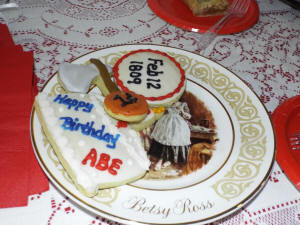
The
cookies made by Mount Pulaskiís favorite cookie lady, Helen Schmidt,
were cut and decorated in various shapes that commemorated the life
of the President and his pre-presidency history in Illinois.
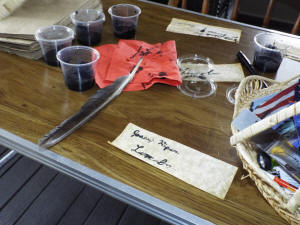
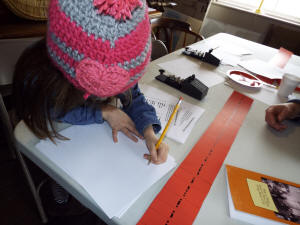
Events
for children included learning and writing messages in Morse code,
and learning how to write with a quill pen. Morse code was used
during the Civil War as the primary quick communication from the
front line battles to the President. And, the quill pen predated the
ball point ink pen, and was the standard instrument for penning
letters and other documents.
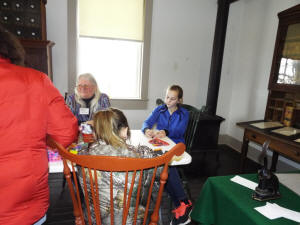
Kids in
the downstairs area were also given an opportunity to make their own
valentines from scratch for giving to friends or family later this
week.
Upstairs, Woodard was introduced to the audience by a good friend,
Jason Hosfield, who had traveled with him from their homes in Clark
County. Woodard then took command of the audience, transporting them
into the day Lincoln was shot, as he aptly portrayed the 16th
President.

The skit was written by Ken Bradbury, a well-known playwright who
has written a number of scripts pertaining to the Lincolnís. The
scene opened with Lincoln recounting his lovely day. He and Mary
were looking forward to spending a night at the Ford Theater
watching ďOur American Cousin.Ē Lincoln recalled that a number of
people had been invited to join the Lincolnís but sadly, many of
them had to decline including General Grant and Secretary Stanton.
The Lincolnís had finally secured the company of Major Henry
Rathbone and his finance Clara Harris.
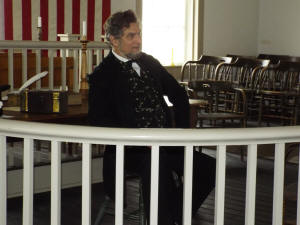
Late in
the afternoon, when he should have been preparing for the play,
Lincoln received a caller, Speaker of the House of Representatives
Schuyler Colfax. For all practical purposes the surrender of Lee
signified the end of the Civil War. Colfax was there to speak with
the President on two topics in particular.
He wanted to know if there should be a call for a special meeting of
Congress for the end of the war. Lincoln said he did not want to
call a special session, and Colfax reminded him that such a session
had been called at the onset of the war. Lincoln told Colfax that he
felt that with the conclusion of the war, the entire situation would
go more smoothly if congress did not participate. Lincoln felt he
would be able to bring the divided nation back into unity on his
own, and that it would be preferred over getting congress involved.
Colfax
also seemed anxious to try Lee and others for treason. Again Lincoln
strongly objected, saying there would be no treason trials and no
hangings in the aftermath of the war.

[to top of second column] |

Lincoln explained his position saying first, that
he personally was not considering that the Civil War was a
battle with the states. Rather, he preferred to think of it as a
few rebels. He said for that reason congress did not need to get
involved. He also said that he didnít want anyone brought to
trial, because if a trial were to occur, there was the
possibility that the legality of many of the issues around the
succession could be brought into the argument, and he did not
want to see that happen.

When Mary began pushing the President to get ready for the
theater, he called his visit with Colfax to an end and said
brightly that if there were further discussion needed, Mr.
Colfax was invited to return tomorrow. Neither man knew, there
would be no tomorrow.
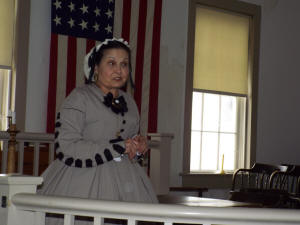
With the
President busy getting ready for the play, the skit shifted to Mary
Lincoln who was preparing to make the dayís entry into her diary.
Noting she had company, Mary stopped to greet her guests and began
telling them about her great love for the President, and how this
had been an especially good day.
Mary too had awaken in good spirits, also very happy that her son
Robert was home for a while, but also happy that the war was over.
Yes, there were still some surrenders that would be forthcoming from
the Confederate armies, but the surrender of Lee at Appomattox was
the apex. She was relieved for her husbandís sake and said that she
had seen the war take a toll on him. Yet, his love for Mary had been
ever strong. She recalled that in the worst of it all when he would
come to bed late in the night, he would reach out to her and calling
her by his pet name, ďMolly,Ē and would tell her he loved her more
than anything in the world.
Mary spoke about the first and second courtships, when after she had
abruptly rejected Mr. Lincoln, the two had an ďarmyĒ of family and
friends who brought them back together.
Mary spoke about the political letters she and Abraham had written
under aliases during their courtship. She said that many believed
they were secret, yet public love letters, but that was not true.
The letters were a joke between the two and a political poke at
others. One reader, thinking Mary to be a man had challenged her to
a duel over her positions in the letters. She said that in order to
protect her, Abraham had agreed to fight the angry reader.

Mary had criticized James Shields, who demanded a retraction. When
no retraction came, he challenged the writer to a duel. She held up
a lump of coal and explained its meaning. When the public heard of
the challenge, one reader wrote, ďWell then if they must fight,
broomsticks, hot water, or a shovel of hot coals should suffice.Ē
Mary also spoke about the first home she and Abraham had shared, a
12 by 14 foot room in a boarding house in Springfield. She spoke of
life in the white house, and how she had lost two of her children.
Mary also spoke of the shadows that came creeping into her life,
dark auraís that spoke of doom. She had seen such shadows throughout
her life, and even today as she spoke with her guests, she caught a
fleeting shadow passing over the room.
Speaking of the wonderful day it had been with her husband, and
Robert home from the war, Mary talked about a lovely carriage ride
she had taken with the President. Just the two of them, and it had
been a romantic and endearing moment for the President and his wife.
Mary shared throughout her visit, items from her special memory box.
She explained that these were the things that she held dearest and
made her feel secure. The love letters, the lump of coal from the
duel, a letter Abraham had written for Maryís half-sister to sign.
Emily Todd Hill was a confederate, with a husband who fought in the
Confederacy and gave his life. She had asked to come for a visit
after Willie Lincoln died. Abraham Lincoln had written a letter for
her to sign, saying she was disavowing the Confederacy. Emily
refused to sign the letter, but was permitted to visit the Lincolnís
anyway.
And, another prized possession in the memory box, a copy of Abraham
Lincolnís favorite poem, Mortality. She read excerpts from the poem,
including a stanza that appeared to be somewhat of an omen in the
lives of the Lincolns.
The infant a
mother attended and loved;
The mother that infant's affection who proved;
The husband, that mother and infant who blest,-
Each, all, are away to their dwellings of rest.

Throughout her visit with guests, Mary would call out to her
husband, was he ready yet, she didnít want to be late, yet she
surmised that no matter what, they would be late, and though yes,
they had seen this play before, she never got to see the first
curtain of any play because her husband was always late.
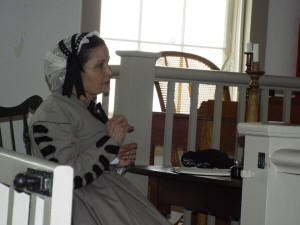
As she
finally saw that her husband was nearing readiness, Mary Lincoln sat
back down before her journal making an entry to account for her day.
As she wrote, the shadows moved into the room passing quickly in and
out, but not going unnoticed by the woman at her desk.
The shadows of doom that would cloak the end of the day as John
Wilkes Booth would deliver that fatal wound that would take the life
of a President and completely destroy the life of his wife, two
tragedies with one bullet, and a nation mourned.
[Nila Smith] |